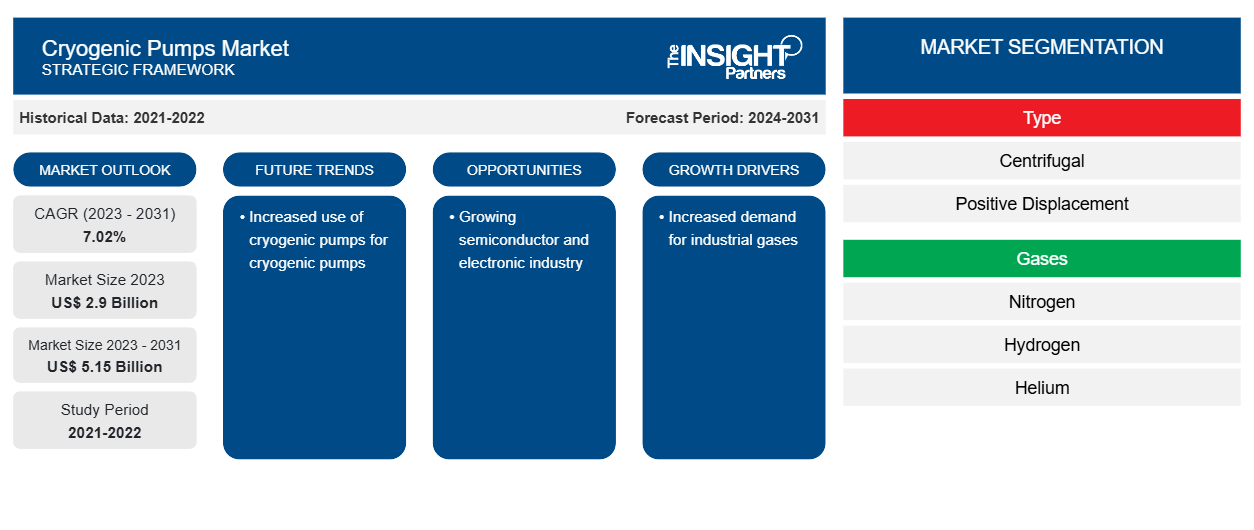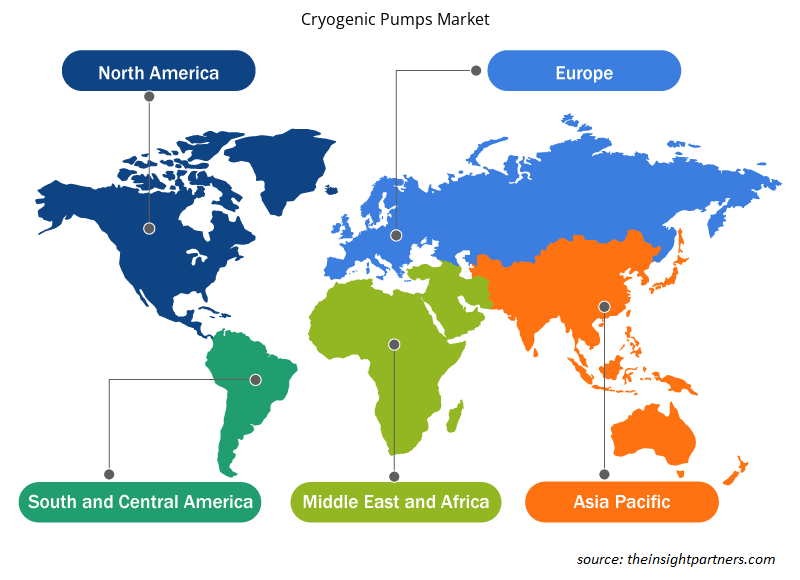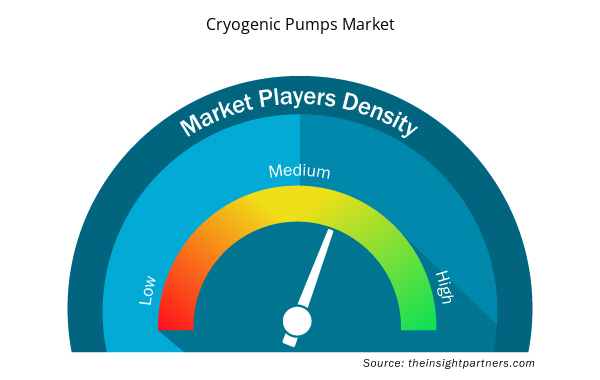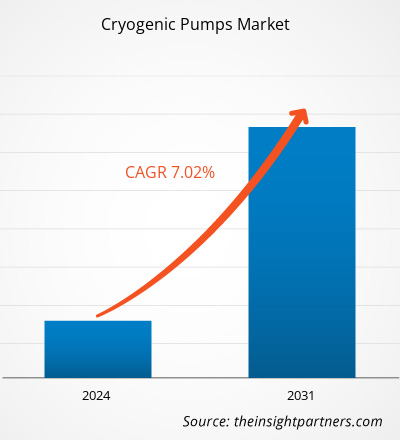The Cryogenic Pump Market size is expected to reach US$ 3,543.58 million by 2031 from US$ 2,429.13 million in 2024. The market is estimated to register a CAGR of 5.6% during 2025–2031. The increasing investments in the healthcare sector are likely to bring new trends to the market in the coming years.
Cryogenic Pump Market Analysis
Cryogenic pumps or cryopumps are cryogenic equipment used for transferring and pressurization liquefied gases. It is a type of vacuum pump used for cryogenic gases such as nitrogen, oxygen, LPG, and argon. Cryogenic pumps enable efficient cooling, making them ideal for applications where rapid and sustainable cooling is required. Further, the design of these pumps allows them to operate at high precision, ensuring optimal performance even in extreme conditions. Moreover, the cryogenic pumps are built with safety devices that make them leak-proof, ensuring that they are highly safe while transferring the cryogens. In the past few years, cryogenic pump manufacturers have integrated an automated control system, which further enhances monitoring and precise operations of these pumps.
Cryogenic Pump Market Overview
The cryogenic pump market is expected to experience significant growth in the coming years due to industrialization, especially in emerging economies. The cryogenic pump market is gaining traction with the growing demand for liquefied gases. The rising demand for sustainable and clean fuels to replace fossil fuels, which emit carbon emissions. As a result, the demand for LNG increased, ultimately driving the need for gas handling systems. Asia Pacific is one of the largest consumers of LNG owing to industrialization in countries such as China, India, Japan, South Korea, and Indonesia. As per the data published by Shell plc, Asia Pacific economic growth is projected to drive a 60% increase in LNG demand by 2040. More than 170 million tonnes of new LNG supply is expected to grow by 2030 to meet the growing demand, especially from Asian countries. China and India are two major countries in Asia Pacific that are taking notable initiatives to increase their LNG import capacity. Increasing demand for liquefied natural gas and growing industrial investments, among others, are some of the major drivers boosting the growth of the market.
Customize This Report To Suit Your Requirement
You will get customization on any report - free of charge - including parts of this report, or country-level analysis, Excel Data pack, as well as avail great offers and discounts for start-ups & universities
Cryogenic Pump Market: Strategic Insights

- Get Top Key Market Trends of this report.This FREE sample will include data analysis, ranging from market trends to estimates and forecasts.
You will get customization on any report - free of charge - including parts of this report, or country-level analysis, Excel Data pack, as well as avail great offers and discounts for start-ups & universities
Cryogenic Pump Market: Strategic Insights

- Get Top Key Market Trends of this report.This FREE sample will include data analysis, ranging from market trends to estimates and forecasts.
Cryogenic Pump Market Drivers and Opportunities
Increasing Demand for Liquefied Natural Gas
The demand for clean energy fuels and renewables is growing at an unprecedented rate, with a growing focus on carbon emissions and pollution. Liquefied natural gas (LNG) is one of the clean energy fuels with diverse applications. The fuel is the source for heating, electricity generation. The adoption of LNG has increased significantly as it is highly suitable for power generation and industrial applications, owing to its high efficiency while emitting low carbon emissions. Cryogenic pumps play an important role in the transportation of LNG. For effective transportation, the natural gas is maintained at an extremely low temperature. These pumps have a special design that includes special materials, thermal insulation, and sealing that ensures safety and reliability at extreme temperatures. Thus, the adoption of cryogenic pumps is high in the LNG industry.
As per the data published by Shell plc in February 2024, the global LNG trade reached 404 million tons in 2023, up from 397 million tons in 2022. Further, as per the data published by the Department of Energy in 2024, the LNG demand in 2021 was 100 billion cubic meters (bcm), whereas in 2022, the demand reached ~175 billion cubic meters (bcm). Asia Pacific accounted for a major share of the global demand for LNG. As per the data published by Shell Plc in 2025, the demand for LNG strengthened in 2024; China was one of the notable countries in the region. In 2024, China imported 79 million tons of LNG. On the other hand, India’s imports peaked in 2024 to meet the increasing power demand. The demand for LNG in 2024 in India reached 27 million tons, which is a 20% hike from 2023. Malaysia and Indonesia have emerged as notable exporters of LNG in Asia Pacific. According to the data published by the International Gas Union in 2023, Indonesia’s LNG exports reached 15.6 million tons in 2023, while Malaysia exported 2.6 million tons. However, the export capacity of both countries is ~30 million tons. Thus, the surging demand for LNG and expansion of trades across the globe subsequently accelerates the demand for cryogenic pumps for efficient and secure transportation.
Growing Applications in the Energy Sector
The global demand for energy is growing rapidly, owing to industrialization and urbanization. As per the data published by the International Energy Agency in 2025, the global energy demand increased by 2.2% in 2024 from 2023, faster than the average growth rate of the past decade. Further, between 2024 and 2030, it is expected that the capacity of renewable energy generation will be increased by 5,500 gigawatts (GW), three times higher than the increase witnessed between 2017 and 2023. This shows rapid growth in demand for energy. Thus, to meet the growing demand, the government and energy companies worldwide are undertaking various research and developmental activities to develop innovative energy generation and storage systems. Cryogenic Energy Storage is one of them. Cryogenic energy storage involves the use of extremely low temperatures to release and store energy. This provides an efficient and effective solution for large-scale energy system projects. In cryogenic energy storage, gases are cooled down to convert air into a liquid form, which is then stored at a very low temperature. Cryogenic pumps play an important role in these systems by handling the cryogens (liquified gases) effectively and efficiently.
Considering the increased energy demand and need for energy storage systems, governments are investing in the development and installation of cryogenic energy storage systems. For instance, in October 2024, the Scottish government inaugurated the world’s largest liquid air LDES project in the country. In November 2024, researchers at Dongguk University in South Korea successfully designed a standalone liquid air energy storage (LAES) system with significant improvements in energy efficiency and economic performance. Moreover, in October 2024, the UK government announced the initiation of a US$ 300 million cryogenic energy storage system project in Manchester, UK. Such growing investments in cryogenic energy storage systems, owing to increasing demand for energy, are expected to create lucrative opportunities for the cryogenic pump market during the forecast period.
Cryogenic Pump Market Report Segmentation Analysis
Key segments that contributed to the derivation of the Cryogenic Pump Market analysis are type, design type, cryogen, and industry vertical.
- In terms of type, the market is bifurcated into centrifugal and positive displacement. The centrifugal segment dominated the market in 2024.
- By design type, the market is bifurcated into submersible and non-submersible. The submersible segment dominated the market in 2024.
- Based on cryogen, the market is divided into nitrogen, argon, oxygen, LNG, hydrogen, helium, and others. The LNG segment dominated the market in 2024.
- Based on industry vertical, the market is divided into electronics and semiconductor, healthcare and pharmaceutical, energy and power, metallurgy, aerospace, chemical, and others. The energy and power segment dominated the market in 2024.
Cryogenic Pump Market Share Analysis by Geography
The Cryogenic Pump Market is segmented into five major regions: North America, Europe, Asia Pacific (APAC), the Middle East and Africa (MEA), and South and Central America (SAM). Asia Pacific dominated the market in 2024, followed by North America and Europe.
The cryogenic pump market in Asia Pacific is segmented into China, Japan, South Korea, Australia, and India. The semiconductor materials market, worth US$ 64 billion, includes chemicals and materials used in the frontend (US$ 40 billion) and back-end (ATP) (US$ 24 billion) of the supply chain. Within the frontend materials segment, silicon wafers and photoresist account for ~US$ 19.5 billion, representing about half of the total market. Moreover, other essential subcategories such as gases, wet chemicals, CMP slurries, and sputtering targets play critical roles in various fabrication processes.
The back-end ATP market, valued at US$ 95 billion, is heavily concentrated in Northeast Asia, with significant capacities located in South Korea, Mainland China, and Taiwan, holding ~60% of global ATP capacity. Since 2023, out of 36 ATP facilities announced, 25 are projected to be established in Mainland China and Taiwan, driven by lower construction and skilled labor costs. Taiwan and South Korea are both pivotal in semiconductor manufacturing, with Taiwan capturing over 70% of advanced node chip manufacturing (<10 nanometers) through TSMC's cutting-edge foundry business. South Korea has also made substantial investments in its semiconductor industry, with companies such as Samsung and SK Hynix leading the global markets for NAND flash memory and DRAM chips, respectively, which is having a positive impact on the cryogenic pump market.
Cryogenic Pump Market Regional Insights
The regional trends and factors influencing the Cryogenic Pump Market throughout the forecast period have been thoroughly explained by the analysts at Insight Partners. This section also discusses Cryogenic Pump Market segments and geography across North America, Europe, Asia Pacific, Middle East and Africa, and South and Central America.

- Get the Regional Specific Data for Cryogenic Pump Market
Cryogenic Pump Market Report Scope
| Report Attribute | Details |
|---|---|
| Market size in 2024 | US$ 2,429.13 Million |
| Market Size by 2031 | US$ 3,543.58 Million |
| Global CAGR (2025 - 2031) | 5.6% |
| Historical Data | 2021-2023 |
| Forecast period | 2025-2031 |
| Segments Covered |
By Type
|
| Regions and Countries Covered | North America
|
| Market leaders and key company profiles |
Cryogenic Pump Market Players Density: Understanding Its Impact on Business Dynamics
The Cryogenic Pump Market is growing rapidly, driven by increasing end-user demand due to factors such as evolving consumer preferences, technological advancements, and greater awareness of the product's benefits. As demand rises, businesses are expanding their offerings, innovating to meet consumer needs, and capitalizing on emerging trends, which further fuels market growth.
Market players density refers to the distribution of firms or companies operating within a particular market or industry. It indicates how many competitors (market players) are present in a given market space relative to its size or total market value.
Major Companies operating in the Cryogenic Pump Market are:
- SHI Cryogenics Group
- Fives SAS
- Cryostar SAS
- Ebara Elliott Energy
- CRYOGENIC MACHINERY CORP
- Nikkiso Co Ltd
Disclaimer: The companies listed above are not ranked in any particular order.

- Get the Cryogenic Pump Market top key players overview
Cryogenic Pump Market News and Recent Developments
The Cryogenic Pump Market is evaluated by gathering qualitative and quantitative data post primary and secondary research, which includes important corporate publications, association data, and databases. A few of the key developments in the Cryogenic Pump Market are listed below:
- Sulzer recently celebrated the official launch of a new test and assembly center in Mexico City, which was built alongside its existing pump manufacturing facility. With this expansion, Sulzer Mexico’s pump facility enhances production capacity for its range of large pumps to help meet growing demand for infrastructure in the Americas. (Source: Sulzer, Press Release, March-2025)
- Vanzetti Engineering is expanding its product portfolio by introducing a new family of submerged pumps, the ESK-IMO retractable series with flow rates from 70 m3/hr up to 500 m3/hr and a head of up to 240m. (Source: Vanzetti Engineering, Press Release, March-2024)
Cryogenic Pump Market Report Coverage and Deliverables
The "Cryogenic Pump Market Size and Forecast (2025–2031)" provides a detailed analysis of the market covering the areas mentioned below:
- Cryogenic Pump Market size and forecast at global, regional, and country levels for all the key market segments covered under the scope
- Cryogenic Pump Market trends, as well as market dynamics such as drivers, restraints, and key opportunities
- Detailed PEST and SWOT analysis
- Cryogenic Pump Market analysis covering key market trends, global and regional framework, major players, regulations, and recent market developments
- Industry landscape and competition analysis covering market concentration, heat map analysis, prominent players, and recent developments for the cryogenic pump market
- Detailed company profiles
- Historical Analysis (2 Years), Base Year, Forecast (7 Years) with CAGR
- PEST and SWOT Analysis
- Market Size Value / Volume - Global, Regional, Country
- Industry and Competitive Landscape
- Excel Dataset


- Hydrogen Storage Alloys Market
- Rugged Phones Market
- Rare Neurological Disease Treatment Market
- Vaginal Specula Market
- Identity Verification Market
- Redistribution Layer Material Market
- Pipe Relining Market
- Integrated Platform Management System Market
- Precast Concrete Market
- Third Party Logistics Market

Report Coverage
Revenue forecast, Company Analysis, Industry landscape, Growth factors, and Trends

Segment Covered
Type, Gases, Industry Vertical, and Geography

Regional Scope
North America, Europe, Asia Pacific, Middle East & Africa, South & Central America

Country Scope
This text is related
to country scope.
Frequently Asked Questions
What are the future trends of the cryogenic pump market?
Increasing investments in Healthcare Sector
What is the estimated global market size for the cryogenic pump market in 2024?
The cryogenic pump market was valued at US$ 2,429.13 million in 2024; it is expected to register a CAGR of 5.6% during 2025–2031.
What will the cryogenic pump market size be by 2031?
The cryogenic pump market is expected to reach US$ 3,543.58 million by 2031.
Which are the leading players operating in the cryogenic pump market?
The key players operating in the cryogenic pump market include SHI Cryogenics Group, Fives SAS, Cryostar SAS, Ebara Elliott Energy, CRYOGENIC MACHINERY CORP, Nikkiso Co Ltd, Sulzer Ltd, Ruhrpumpen, Inc., Vanzetti Engineering S.p.A., Trillium US Inc., PHPK Technologies, Technex Limited, Barber-Nichols, Inc., HSR AG, and GemmeCotti Srl.
What are the driving factors impacting the cryogenic pump market?
Increasing Demand for Liquefied Natural Gas # Growing Industrial Investments
Trends and growth analysis reports related to Manufacturing and Construction : READ MORE..
The List of Companies - Cryogenic Pump Market
- SHI Cryogenics Group
- Fives SAS
- Cryostar SAS
- Ebara Elliott Energy
- CRYOGENIC MACHINERY CORP
- Nikkiso Co Ltd
- Sulzer Ltd
- Ruhrpumpen, Inc.
- Vanzetti Engineering S.p.A.
- Trillium US Inc.
- PHPK Technologies
- Technex Limited
- Barber-Nichols, Inc.
- HSR AG
- GemmeCotti Srl

 Get Free Sample For
Get Free Sample For